Postdoctoral researchers
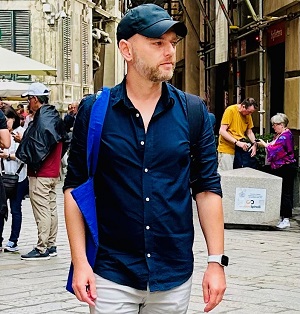
Anastasios Vogiatzis
Anastasios Vogiatzis holds a BA in English Language and Literature and a Ph.D. in Cognitive Linguistics from the School of English, Aristotle University of Thessaloniki. He also earned an MA in Theoretical Linguistics from Radboud University Nijmegen, The Netherlands. His research interests primarily revolve around Cognitive Linguistics and political discourse. Currently, he is engaged in postdoctoral research at the School of English, where he delves into the analysis of metaphor usage on Twitter. Specifically, he investigates the process of delegitimizing the European Union in the period leading up to the #Brexit referendum in the United Kingdom, as promoted by key proponents of #Brexit. Additionally, he assesses the extent to which audiences on this social media platform incorporate the metaphoric frames articulated in politicians’ tweets into their online written responses.
Starting date of his project: March 2021
For a full CV please click here.

Thomai Dalpanagioti
Thomai Dalpanagioti is a full-time faculty member at the Department of Theoretical and Applied Linguistics, School of English, Aristotle University of Thessaloniki. She holds an MA in Lexicography (Theory and Practice) and a PhD in Linguistics-Lexicography from the National and Kapodistrian University of Athens. She has taught English as a Foreign Language at all levels of education and worked as an adjunct researcher at the Centre for the Greek Language and as an adjunct lecturer at the Hellenic Open University and the University of Nicosia. Her research interests are in the areas of cognitive linguistics, corpus linguistics, lexicography, and vocabulary acquisition. In 2022 she was awarded the A.S. Hornby Dictionary Research Award for conducting a study on integrating frame semantic resources into EFL instruction. This postdoctoral research puts a frame-inspired task-based approach to metaphor teaching into practice and demonstrates how lexicographic resources like FrameNet and MetaNet, which go beyond the scope of conventional dictionaries, can be of practical use to EFL teachers and learners. Her work has been presented in international conferences and published in conference proceedings and peer-reviewed journals.
Starting date of her project: October 2022
Departmental webpage: click here
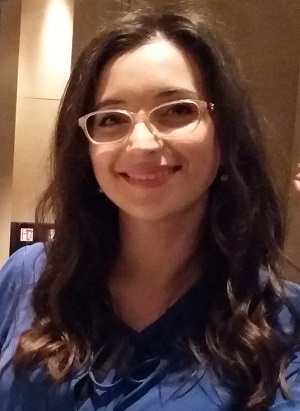
Maria Kaltsa
Maria Kaltsa is a postdoctoral researcher in the area of Psycholinguistics. She holds an MPhil in Linguistics from the University of Cambridge (Funding: Cambridge European Trust 2006-2007), and a PhD from Aristotle University of Thessaloniki (2012). Her doctorate research (Dissertation Title: The Acquisition of Telicity in the Native Language) was funded by Heracleitus II (Award No: 86348). She has worked as a postdoctoral researcher for the Thalis Project: Bilingual Acquisition & Bilingual Education: The Development of Linguistic & Cognitive Abilities in Different Types of Bilingualism (BALED) in the Department of Theoretical and Applied Linguistics of the School of English AUTH (2012–2015) and at the Centre for the Greek Language (2011-2015) and as a lecturer at the Hellenic Open University (2017-). In 2016, she received a Postdoctoral Research Award of Excellence & Innovation from the AUTH Research Committee and she worked on the lexical processing of individuals with Alzheimer’s. In 2019, she started her Postdoctoral Research on the assessment of eye-tracking methodology in the evaluation of linguistic and cognitive development during infancy and pre-school years at the Department of Theoretical and Applied Linguistics of the School of English AUTH (Project Duration: 2019-2022). Additionally, in 2019, she received a Postdoctoral Research Grant on the mental lexicon of bilingual children and the impact of linguistic and cognitive factors on lexical parsing which is co-financed by Greece and the European Union (European Social Fund- ESF) through the Operational Programme «Human Resources Development, Education and Lifelong Learning» in the context of the project “Reinforcement of Postdoctoral Researchers – 2nd Cycle” (MIS-5033021), implemented by the State Scholarships Foundation (ΙΚΥ) (Award No: 18248 | Project Duration: 12/2019-11/2021). Currently, she is the PI of the Research Project “Linguistic Perspectives on Dementia: an investigation of lexical, syntactic & content complexity in the narratives of Greek speaking patients with Mild Cognitive Impairment and Alzheimer’s Disease” (DemLENS) supported by the Hellenic Foundation for Research and Innovation (H.F.R.I.) (Project Number: 98109 | Project Duration: 12/2020-12/2023). Her scientific interests involve lexicon, (morpho)syntax, interface phenomena, L1/L2 acquisition, multilingualism, first language attrition, language processing and dementia.
Start: January 2019
For a full cv click here.

Evaggelia Kyritsi
Η Ευαγγελία Κυρίτση έχει σπουδάσει Αγγλική Γλώσσα & Φιλολογία στο Αριστοτέλειο Πανεπιστήμιο Θεσσαλονίκης. Έχει MA και Διδακτορικό στην Κλινική Γλωσσολογία από το Πανεπιστήμιο του Reading. Το θέμα της διδακτορικής της διατριβής ήταν η φωνολογική επίγνωση στα κωφά Ελληνόπουλα. Από το 2007, διδάσκει Aγγλικά ως ξένη γλώσσα κυρίως σε κωφά/βαρήκοα παιδιά αλλά και σε παιδιά με γλωσσικές διαταραχές και διαταραχές στην επικοινωνία. Τα κύρια ερευνητικά της ενδιαφέροντα είναι η κλινική γλωσσολογία, η ψυχογλωσσολογία, ο γραμματισμός, και η διδασκαλία της Αγγλικής ως ξένης γλώσσας σε κωφά/βαρήκοα παιδιά και σε παιδιά με γλωσσικές διαταραχές και διαταραχές στην επικοινωνία.
Για το πλήρες βιογραφικό κάντε κλικ εδώ.

Christopher Lees
I graduated with a BA in Modern Languages (Greek, German, French) from the University of Birmingham, UK. Subsequently, I moved to Greece, in order to pursue postgraduate studies, graduating with a MA in Theoretical and Applied Linguistics from the University of Athens (Sylff fellowship) and a PhD in Sociolinguistics from the Aristotle University of Thessaloniki (IKY scholarship). My research interests focus on language and society, with a particular emphasis on language variety, digital language communication, (Critical) Discourse Analysis, and sociolinguistic approaches to translation. I am currently carrying out postdoctoral research (IKY scholarship) in the School’s Department of Translation and Intercultural Studies on the “translation landscape” of Thessaloniki. The term translation landscape is one I have adapted from the related sociolinguistic subfield of Linguistic Landscape Studies (LLS), which analyses the language visible in public spaces, such as on signs, shop fronts, graffiti etc. By combining theoretical approaches from Sociolinguistics and Translation Studies, the purpose of my research is to establish a new theoretical framework which will analyse the ways in which Greek source texts visible in public spaces are translated into English in relation to language, society, space and time, and identity for the purpose of being understood by non-Greek speakers.
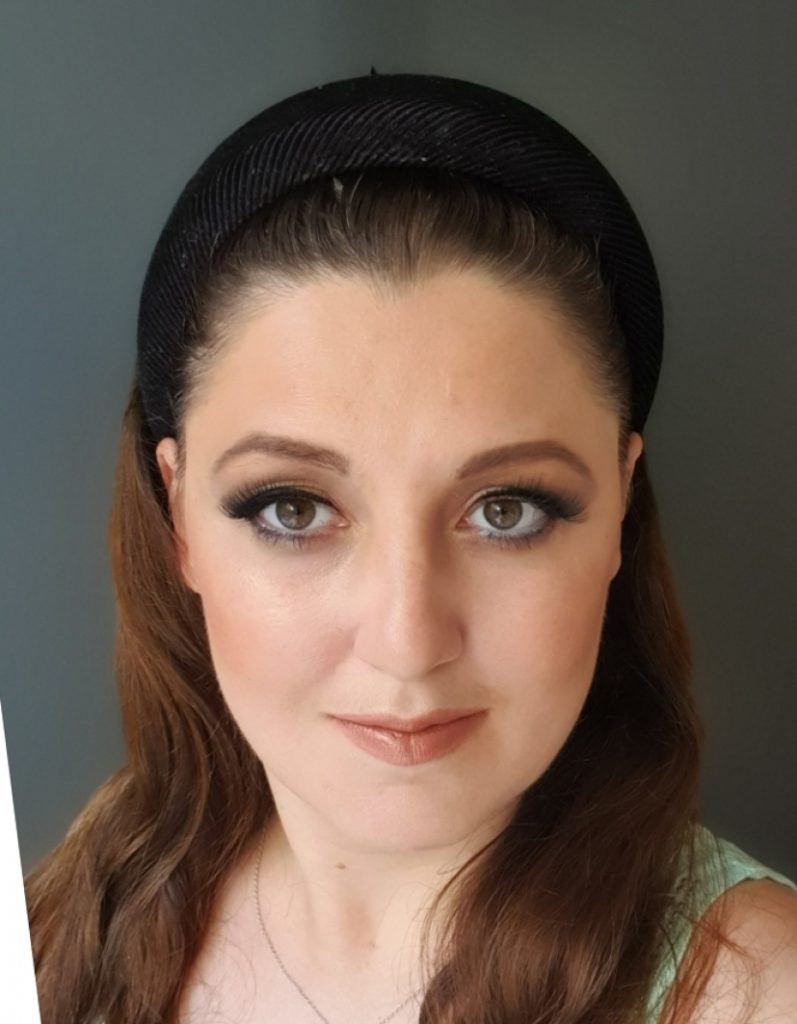
Iren Hovhannisyan
The aim of the research was to explore Greek university students’ attitudes and motivation to learn FLs and their experiences of using FLs within their institutions and abroad, whether they felt the need to learn different foreign languages, what the motives for learning FLs were and how career prospects and general societal situation might influence language choices and language practices. What is more, the results of the research were believed to help to outline the multilingual profile of Greek university students; to draw the linguistic map of most preferred FLs, and to explore students’ attitudes towards FL learning and the effort that they were going to put into learning a FL.
In addition, another very important stance that was intended to be examined in a very implicit way was whether the economic crisis in Greece and the students’ desire to immigrate and work abroad were interrelated and affected the students’ motivation to learn a specific FL or FLs. The results were believed to show what the role of FLs is in this case and how motivated the students were to learn a FL for this end.
Period: 01-04-2016 to 31-03-2017
For a full CV please click here.
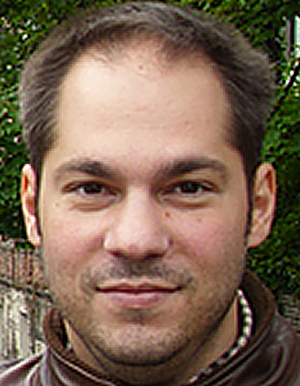
Angelos Lengeris
Angelos Lengeris is a Lecturer in Linguistics at the University of Kent, Department of English Language and Linguistics. His main interests are in the areas of phonetics, second-language learning and TEFL/TESOL. His PhD thesis examined the use of new technologies for improving English perception and pronunciation for Greek learners of English. In 2012, he was awarded a 3-year GSRT Postdoctoral Fellowship co-funded by the European Social Fund and the Greek State. This work extended his PhD research by examining (a) the concurrent learning of English vowels and consonants by Greek learners of English and (b) whether learning transfers to conversational speech. Other projects he has worked on have looked at the learning of second-language intonation, the acoustics of vowels in different speaking styles, the phonetics and phonology of Greek dialects, and the perception of stress.
Personal webpage: https://aleggeris.wixsite.com/lengeris
Departmental webpage: https://www.kent.ac.uk/secl/ell/staff/lengeris.html
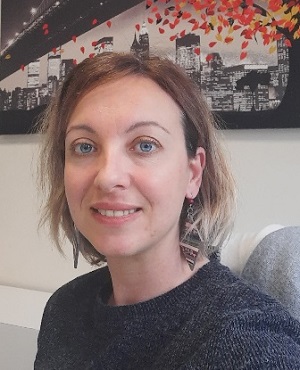
Elina Nirgianaki
Her post-doctoral studies focus on the acquisition and development of Greek fricative consonants by young children. Basic aims of the research are the description of the Greek fricative consonants as produced by young children with the use of reliable acoustic measures, the role of the age, gender and vowel context to their production, as well as their interpretational power in relation to the anatomical/ physiological differences in childhood and the possible differentiation in the space-temporal coordination of children’s movements. Moreonver, through an impressionistic analysis, the researcher will investigate how adults perceive fricatives produced by children and what is the relationship of this perception to the acoustic analysis results.
Starting date of her project: July 2021
Personal webpage: https://www.researchgate.net/profile/Elina-Nirgianaki
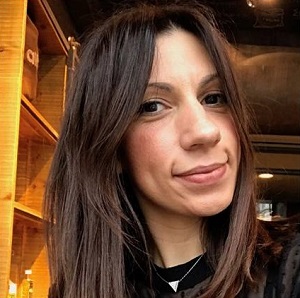
Vinia Dakari
My current project involves field observation and data collection and analysis on the aesthetics and reception of cancer-related performance in Greece. It expands on the philosophical/theoretical/analytical framework I introduced in my doctoral dissertation, titled “Performing Cancer: Toward an Aesthetic of the Unpresentable,” which accommodated the aesthetic aspects of the unpresentability of cancer in Anglophone and German performances as well as their impact on spectators.
My research and writing encompass current developments in the rising interdisciplinary field of the Critical Medical Humanities and, more specifically, the aesthetic, therapeutic, and pedagogic values of the theatre/medicine encounter.
I am the Greek Representative for the Arts Health Early Career Research Network (ECRN) and regular member of the Greek Cancer Society’s Centre for Support, Education and Research in Psychosocial Oncology Working Group. I have co-edited MEDICINE AND/IN THEATRE, a special topic issue of Critical Stages/Scènes Critiques, the e-journal of the International Association of Theatre Critics (IATC). Find more on my personal website: https://auth.academia.edu/VirginiaDakari.
Starting date of her project: November 2017
For a full cv click here.

Vaia Papachristou
Η συνδυαστική διδακτική προσέγγιση PRO-VOC για τη διδασκαλία της προφοράς και του λεξιλογίου σε μαθητές της Αγγλικής ως ξένης γλώσσας
Ο στόχος της ερευνητικής αυτής πρότασης είναι η πειραματική εφαρμογή της συνδυαστικής διδακτικής προσέγγισης PRO-VOC για την ταυτόχρονη εκμάθηση της προφοράς και του λεξιλογίου και από μαθητές της Αγγλικής ως ξένης γλώσσας. Η διδακτική αυτή προσέγγιση έχει πλήρως αναπτυχθεί σε θεωρητικό επίπεδο στην ερευνητική εργασία Nicolaidis & Mattheoudakis (2012) και στοχεύει να καλύψει το σημαντικό κενό που αφορά στη διδασκαλία της προφοράς στην ξενόγλωσση εκπαίδευση σε σχέση με τη διδασκαλία του λεξιλογίου. Το διδακτικό υλικό που σχεδιάστηκε, μία διαδικασία στην οποία συμμετείχα άμεσα και ενεργά, βασίστηκε στο μοντέλο των Celce-Murcia, Brinton & Goodwin (1996).
Η διδακτική προσέγγιση PRO-VOC αναγνωρίζει τη σημασία τόσο του σημασιολογικού περιεχομένου όσο και της φωνολογικής μορφής των λέξεων με σκοπό να ενδυναμώσει αμοιβαία και ισοβαρώς τα δύο αυτά βασικά στοιχεία της λέξης. Σε θεωρητικό επίπεδο, βασίζεται σε έρευνες που αφορούν την οργάνωση του νοητικού λεξικού στη μητρική και ξένη γλώσσα. H φωνολογική μορφή των λέξεων αποτελεί έναν άξονα πάνω στον οποίο είναι οργανωμένο το λεξιλόγιο τόσο της μητρικής γλώσσας (Wolter 2001; Schmitt 2000) όσο και της δεύτερης γλώσσας (Meara 1982; Verhallen and Schoonen 1998, μεταξύ άλλων). Επιπλέον έχει βρεθεί ότι οι μαθητές μιας δεύτερης γλώσσας τείνουν να παρατηρούν ευκολότερα αλλά και να απομνημονεύουν λέξεις οι οποίες περιέχουν επαναλαμβανόμενους ήχους/μοτίβα (Cook 2000; Lindstromberg & Βoers 2008). Με βάση αυτά τα ευρήματα αναμένεται ότι κάποιου είδους κατηγοριοποίηση ή ομαδοποίηση του λεξιλογίου που βασίζεται στη φωνολογική μορφή ή στους επαναλαμβανόμενους ήχους, μπορεί να διευκολύνει την απομνημόνευση και να βοηθήσει την ανάκληση νέων λέξεων.
For a full cv click here.
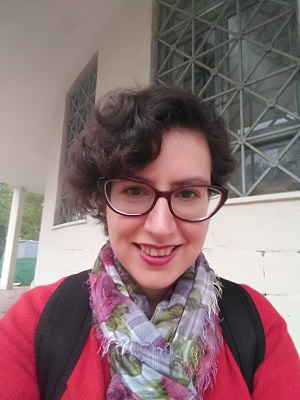
Lizzy Pournara
She is Postdoctoral Researcher at the Department of American Literature and Culture, Aristotle University of Thessaloniki. She holds a Ph.D. in Contemporary American Poetry (2018), an M.A. in English Literature (2013) and a B.A. in English (2011) from the Aristotle University of Thessaloniki (AUTh). For her Ph.D. she was funded by the Greek State Scholarships Foundation (2017-2018). In Fall 2015 she participated as an exchange Erasmus+ student at the Doctoral Program Materialities of Literature at the University of Coimbra, Portugal. In Spring 2016, she was a Visiting Scholar (Stavros Niarchos Foundation IVGS Award) at Sensorium Center for Digital Arts and Technology, at York University in Toronto, Canada. She is the recipient of a Fulbright scholarship for her participation in the Salzburg Global Seminar (2014) and of a Scholarship of Excellence for Ph.D. Candidates (2016) by the Research Committee of AUTh. Her research interests focus on contemporary American poetry, digital literature, augmented reality, immersive narratives and creative writing. She is currently completing an M.A. in Creative Writing at the University of Western Macedonia, Greece. She is a member of the Multimodal Research and Reading Group of School of English, AUTh as well as a member of the Hellenic Association for American Studies and the European Association for American Studies.
Her postdoctoral project, titled “Intersection of Print and Digital Media in North-American Poetry,” explores the intersection of print and digital media in North-American poetry. This project is placed within the interdisciplinary framework of the humanities and new media technologies, and seeks to promote the relationship between literary studies and digital tools. On the one hand, this postdoctoral project focuses on the ways in which digitality affects print poetry. On the other hand, she is interested in the practical application and development of particular technological tools that mold storytelling practices. Within the framework of the Laboratory of Narrative Research, her postdoctoral project specializes in augmented reality as a space of literal intersection of print and digital elements, and she aims at exploring the storytelling potential of immersive media.
Starting date of her project: July 2019
For a full CV please click here.

Evangelia Soulioti
“Implementing CLIL in tertiary ESP settings: The case of Epirus Institute of Technology in Greece”
Content Language and Integrated Learning has become major language learning educational policy promoted by the EU these days. CLIL encompasses any “dual-focused educational approach in which an additional language is used for the teaching and learning of both content and language” (Coyle, Hood and Marsh 2010:1). This research is an attempt to explore the attitudes and perceptions of students in a formal tertiary education setting towards CLIL implementation.
For the scope of the paper a questionnaire was designed and distributed to undergraduate students in the Speech and Language Therapy Department of Epirus Institute of Technology in Greece. The participants attended an ESP course mainly based on CLIL strategies, yet all content courses were taught in the first language and there was no integration of contents and foreign language.
The purpose of this research is twofold: first to gain insight into students’ attitudes and perceptions regarding certain CLIL instructional strategies the teacher implemented in the ESP course and second to explore their reactions and perceptions regarding possible full CLIL implementation across the curriculum. In this respect this paper will discuss ways to implement CLIL in tertiary settings, taking simultaneously into account several limitations: the teaching situation, students’ level of English proficiency, materials and aids, formal syllabus and curriculum. Finally, it hopes to provide diagnostic feedback that will aid in the improvement of ESP course design, as well as useful data to underpin further development of the existing foreign language syllabi and curricula in higher education.
Project period: 2011-2014 | Project Publication & Conference Presentations
Departmental webpage: https://www.ed.ac.uk/profile/evangelia-soulioti

Anna Sfakianaki
Title
Timing, coarticulation and intelligibility in the speech of individuals with hearing impairment
Period: 1/1/2013 – 31/12/2013
Funding
Postdoctoral Research Scholarship of Excellence by the Research Committee of the Aristotle University of Thessaloniki, 2013
Description
Individuals with hearing impairment present deficits in speech development. These deficits can be segmental, such as vowel or consonant errors, or suprasegemental, that is, they can be located in the way sounds are coproduced to form running speech (Fowler, 1980). Moreover, research on American English reports that coarticulatory differences between deaf and normally hearing speakers are not attributable to differences in speaking rate, but rather to specific timing differentiation in their productions (Okalidou, 2002). The present study focuses on a) a systematic investigation of the relationship between coarticulation and intelligibility in hearing-impaired speech, and b) the investigation of relative segmental duration of hearing-impaired vs normal-hearing productions, and its influence on the degree of coarticulation and speech intelligibility. To that end, speech production and perception experiments were conducted with participants with prelingual, profound (91+ dB), sensorineural hearing loss, and with normal hearing. The present study holds implications for the construction and selection of suitable materials for speech and language therapy. Therapeutic goals should focus on the improvement of individual coarticulatory strategies that are detrimental to intelligibility. One of the questions we attempt to answer is whether a speech therapy programme that includes training in relative segmental duration could lead to an improvement of speech parameters, such as coarticulation and timing, and ultimately communication.

Tonia Tsamouris
Tonia (Antonia) Tsamouris is Postdoctoral Researcher at the Department of American Literature and Culture, Aristotle University of Thessaloniki. She has studied Drama and Theatre (BA, 1999, Theatre Department, AUTH). She holds an MA in Drama and Theatre Studies (2000, Drama Department, Royal Holloway Univ. of London) and a Ph.D. in Harold Pinter’s plays and screenplays in relation to M. Merleau-Ponty’s Theory of Phenomenology (2008, School of English, AUTH). She teaches Drama in “Athens’ Drama School-G. Theodosiadis”. She also lectures on Drama and Theatre at “Deree”-American College of Greece. She is a theatre critic; her critics are published at “Theatrografies” (Dodoni Editions) and at the e-magazine Technes-plus.
She has worked as Theatre Expert at the Centre for the Ancient Greek Drama-“Desmi” (2000-2007), as well as a Reader and Project Manager at the Fiction Department of ANT1 TV (2007-2017). She also works as Dramatologue in theatre performances.
She is a member of the Hellenic Association of Theatre and Performing Arts Critics, of the Harold Pinter’s Society, of the Pan-Hellenic Scientific Association of Theatre Scientists, of the “Center for the Semiotics of Theatre” and of HELAAS (Hellenic Association for American Studies).
She has a nine-years old daughter.
Project period: April 2019-April 2022
For a full CV, please click here.

Despoina N. Feleki
She is a Postdoctoral Researcher at the Department of American Literature and Culture, Aristotle University of Thessaloniki in Greece. She has worked as an Adjunct Lecturer in the School of English, AUTh (2019-2020). She also serves as an appointed School Educator in Greece (2000-present). She completed her MA in Studies in European Literature and Culture (2007) and her PhD in Contemporary American Culture in the School of English, AUTh (2015). Feleki teaches undergraduate and postgraduate courses on fiction and pedagogy, focusing on the intersections between textuality and digitality and on how these affect literary and educational practices. Her other research interests include Contemporary Anglophone Literature, World Literature, Popular Culture, Fandom and Videogame Studies. Feleki is a member of the Multimodal Reading and Research Group of the School of English, AUTh. She has served as the Young Scholar Representative of the Hellenic Association for American Studies (HELAAS) and is currently the Treasurer of the same Association. Her monograph, entitled Stephen King in the New Millennium: Gothic Mediations on New Writing Materialities, was out by Cambridge Scholars Publishing in 2018. She is the co-editor of the Special Issue of Ex-centric Narratives: Journal of Anglophone Literature, Culture and Media by HELAAS under the title “Popular Culture in a New Media Age: Trends and Transitions” (forthcoming in December 2020).
In her postdoctoral research project, titled Active Citizenship: The Role of New Media in Literary and Educational Practices, Feleki investigates the entangled repercussions of the wired social media interactions of contemporary Anglophone writers who use literary voice in tandem with digital form as a means of social mobilization. As a researcher and educator in Greek State Education she intends to engage learners of Greek Secondary Education with the School of English (AUTh) and the Narrative Lab in educational and literary projects in order to measure, study and draw valuable conclusions about the entangling power of literature and social media to raise young people’s awareness and energize their participation in collective instances of activism.
Starting date of her project: April 2019
For a full CV, please click here.
